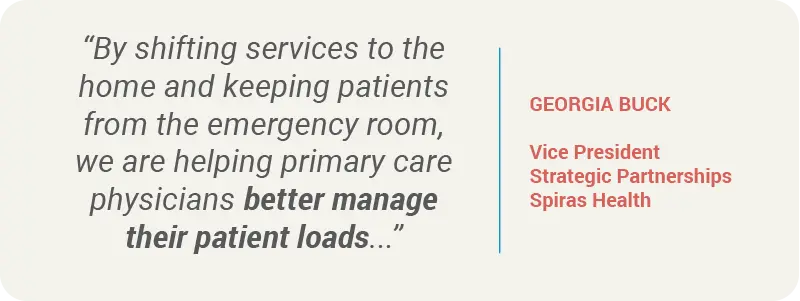Improving Access to Care Amidst the Physician Shortage
By Spiras Health | September 9, 2022

Spiras Health’s care-at-home model provides a proven safety net for providers.
A nationwide shortage of primary care physicians is making it more difficult for health plans to deliver on their promise – to ensure an optimal experience and quality care for their members.
The physician shortage has been growing for years. During the peak of the pandemic, Bellevue Hospital physician Dr. Danielle Ofri warned of the looming physician burnout rate: “Counting on nurses and doctors to suck it up because you know they won’t walk away from their patients is not just bad strategy. It’s bad medicine.”1
Three years later, physicians are walking away from medicine at an alarming rate.
“We talk about a worsening physician shortage,” cautions Janis M. Orlowski, MD, the AAMC’s Chief Healthcare Officer, “but I want to make sure that people understand that there’s a physician shortage today.”
Doctors are retiring or leaving early
According to one study, the U.S. faces a projected shortage of between 37,800 and 124,000 physicians within 12 years.2 A 2021 poll of physicians found that the COVID-19 pandemic has made half of today’s physicians reconsider their career plans. Of those, 21% of physicians are considering early retirement, and another 15% are considering changing professions altogether.3
Primary care physicians (PCPs) face particular challenges: dissatisfaction, long hours, high stress, poor reimbursement, and erosion of their scope of practice. Other factors include burnout before retirement, fewer medical students choosing primary care, insufficient med school openings, and a shortage of postgrad training positions.

Home-based care is helping primary care physicians manage their patient load
Chronic conditions like congestive heart failure, COPD, and other serious diseases require ongoing, active management to prevent emergent flare-ups. Results show that personalized, specialized in-home care can improve outcomes while reducing the burden on PCPs to see patients with chronic conditions in the office.
The PCP shortage can force doctors to stack appointments and leave little to no room to treat patients with emergent needs like a COPD exacerbation or CHF flare-up. Patients face an average of 26+ days to schedule a PCP visit, meaning high-risk patients often end up in the ER instead of the doctor’s office.4

How Spiras Health supports primary care physicians
Spiras Health delivers comprehensive healthcare at home to patients at risk of an emergency event or hospitalization. Instead of an episodic approach that leans on office check-ups and ER visits, Spiras Health uses a longitudinal model to augment PCP care. Ongoing monitoring and management allow Spiras to recognize changes in condition and keep patients as stable as possible.
The Spiras Health care team is not a substitute for PCP care. As an extension of the PCP, the Spiras Health nurse practitioner can diagnose, treat, prescribe medicines, and order tests from home. The Spiras Health clinician can also consult with the PCP to develop a care plan and ensure that the patient gets the medical attention their condition requires.

Delivering value to payers
Health plans enjoy reduced cost of care, plus increased risk adjustment, prescription adherence, member retention, and Stars measures. Easier access to care also enhances health equity and member retention, with 95% of Spiras Health patients rating their Spiras clinician 5 out of 5. The Spiras home-based model also supports health plan initiatives to solve SDoH needs and promote health equity.
“We are helping patients with advanced chronic conditions stay as well-managed as possible,” explains Georgia Buck, Vice President, Strategic Partnerships at Spiras Health. “By shifting services to the home and keeping them from the emergency room, we are helping primary care physicians better manage their patient loads while enhancing patient satisfaction, improving care quality, and reducing costs.”
To learn how to offer Spiras Health to your members with complex needs, contact us using the form below
- www.nytimes.com/2019/06/08/opinion/sunday/hospitals-doctors-nurses-burnout.html
- www.aamc.org/media/54681/download
- www.jacksonphysiciansearch.com/white-paper-on-the-verge-of-a-physician-turnover-epidemic-physician-retention-survey-results/
- www.merritthawkins.com/uploadedFiles/MerrittHawkins/Content/News_and_Insights/Articles/mha-2022-wait-time-survey.pdf

 Prev
Prev